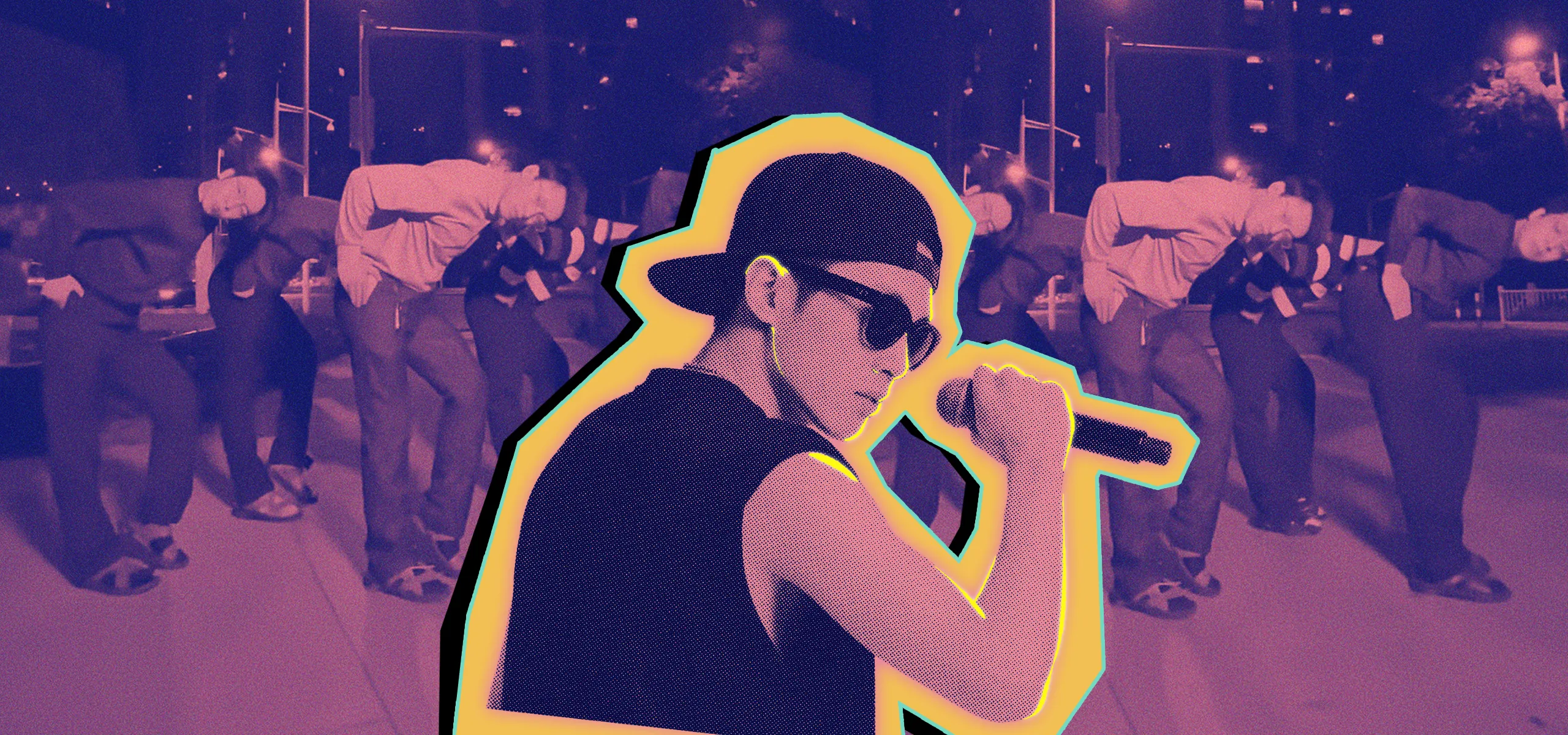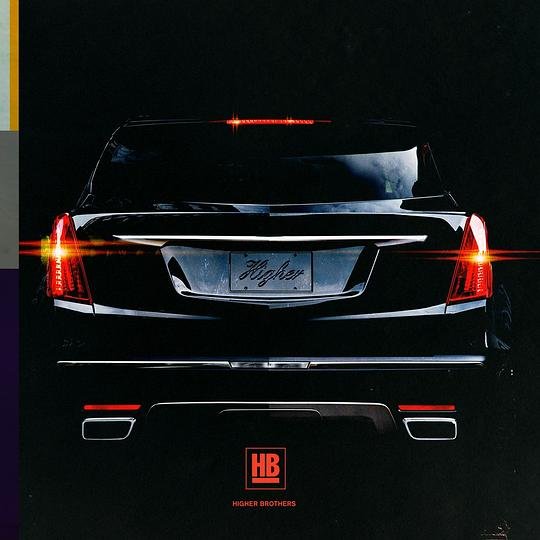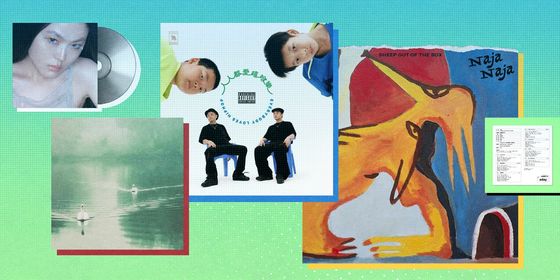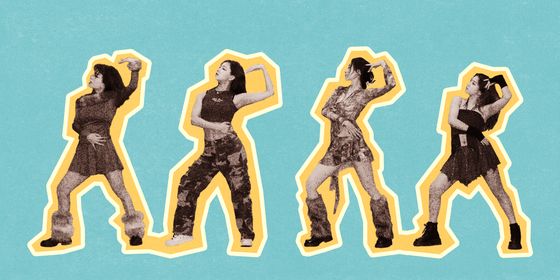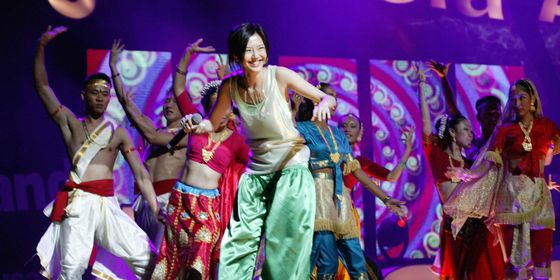Skai Isyourgod (Lan Lao) recently surpassed Jay Chou as the most-streamed Mandopop artist on Spotify, leading the charge for a new generation of rappers climbing the charts
A Gen-Z rapper from Guangdong has quietly dethroned global icons like Jackie Chan and Jay Chou to become the most viral Chinese artist in the world, at least according to TikTok and Spotify. Known online as Skai Isyourgod, or Lan Lao in Mandarin, he surpassed Jay Chou in early July to become the most-streamed Mandarin-language singer on Spotify, racking up over 4 million monthly listeners at the time of writing.
His breakout hit, “Blueprint Supreme,” a fusion of Mandarin and Cantonese rap with elements of Cantonese opera, has exploded into a TikTok dance craze, with everyone from elementary schoolers to K-pop groups like NCT and Enhypen grooving to its hypnotic beat, despite not understanding a single word of the lyrics as many in the comment section say: “Understanding 0%. Vibing 100%.”
The 27-year-old, set to embark on his first world tour, is part of a growing wave of rappers who’ve gone viral by blending their hometown language and culture into their music. While some critics dismiss these songs for their catchy but sometimes tacky lyrics and melodies, many see them as a fresh way for the new generation to preserve and promote local culture, like the viral “Chengdu Disney” rap that drew hundreds of thousands of visitors to the city.
Regardless, their popularity on short video platforms is undeniable. Here are a few tracks that have become unavoidable on the Chinese internet.
Read more about China’s music scene:
- The Stories That Shaped China’s Music Industry in 2023
- Rock is Not Dead in Xinxiang, China’s Former Capital of Rock ‘n’ Roll
- East Meets West Africa: The Growing Popularity of Afrobeats
Stacks from All Sides 八方来财
Another runaway hit from Lan Lao, “Stacks from All Sides” was named Chinese Rap Song of the Year by NetEase Cloud Music, one of China’s largest streaming platforms. The song began sweeping Douyin and TikTok in late 2024. It even coined the meme “sushi don’t lie” on TikTok, after non-Chinese speakers misheard the lyric “ziqi donglai (紫气东来)”—which means “purple air comes from the east,” a symbol of good fortune. The music video has garnered more than 25 million views on YouTube.
Its popularity is not hard to understand. Despite having virtually no melody in the vocal parts, the song gets stuck in your head after just one listen, since all you really have to do is chant along: “lai, lai cai, lai (come, come fortune, come).” The auspicious meaning of the phrase and Lan Lao’s signature Cantonese accent only added to its appeal.
However, many have dismissed it as nothing more than a “brainwashing, dumb, catchy tune” that happens to resonate with today’s internet culture, which favors “abstract” content that embraces absurdity and humor over meaning. Some industry insiders even criticize the song for involving virtually no creative process: All he did was take a catchy melody, run it through distortion, pair it with a TR-808 drum pattern, and chant along to the beat in a southern accent.
Lan Lao himself has acknowledged that social media has played a major role in his success. “Without these short video platforms, I wouldn’t be where I am—it’s this era that makes my success possible,” he told Hongxing News in July.
Still, fans have defended Lan Lao, arguing that his works are a blend of Memphis rap and Guangdong folk culture, and that those unfamiliar with the region and its culture simply won’t understand. They add that “Stacks from All Sides” doesn’t blindly copy the gangster lifestyle often portrayed in American hip-hop. Instead, it sarcastically depicts a uniquely Chinese version of gangster life: a loan shark and underground casino owner who still fears karma catching up to him and keeps returning to temples to pray for God’s blessings.
“Stacks from All Side,” based on publicly available streaming data, is estimated to have made more than 10 million yuan, according to Jiemian News. The artist is rumored to have earned 120 million yuan from all his hit songs. Lan Lao himself dismissed the 120 million figure in an interview but kept quiet about his actual earnings, stating, “I can only say that I’ve gone from ordering 20-yuan takeout to 90-yuan takeout.”
Mochou Township 莫愁乡
Within days after its online release in June, “Mochou Township,” literally “no-worry township,” attracted millions of views and likes, thousands of comments, and even tears. Set to a simple, cheerful melody, the song features 18-year-old rapper Zhao Ziyu singing against scenes of village life. Its heartfelt lyrics tell the story of a confused young person working far from home and family. The sincerity has resonated deeply with listeners, especially those who share a similar experience.
Here’s how the singer depicts his relationship with the grandmother who raised him: “I lied when I told her I work at a state-owned enterprise. I’m actually an ox and a horse, working nine to eight…[She asks] what are you missing over there? Call if you need anything or nothing.”
Now better known by his stage name 亚细亚旷世奇才 (literally “Asian genius”), Zhao grew up with his grandparents in Changchun in northeastern China’s Jilin province, dropped out of school at around 16, and worked odd jobs in Changchun, Beijing, and Hebei’s Langfang. The direct inspiration for the song came from a nightmare about his grandmother’s death, which roused strong feelings about his hometown amid anxieties about his unstable life in Chengdu, where he moved to in April to pursue his music career, Zhao told NetEase Cloud Music.
The song employs the Chengdu dialect—such as 么儿, the local term of endearment for children (often the youngest in the family)—one of the most popular dialects for rap songs in the country, due to its distinctive tones and other features, many of which create a humorous effect.
“The special rhythm of Sichuan dialect makes people feel warm and close,” says Zhao. Having written songs while working in different cities over the past several years, he found rapping in dialects “more pleasant” than in Mandarin Chinese.
Zhao is now working on a piece about Chinese farmers, the final installment in a planned trilogy about people at the margins of society, following the success of “Mochou Township” and “Jiaozuo,” another hit about migrant construction workers from Jiaozuo in Henan province.
Factory 工厂
Born in 1997, Zhang Fangzhao, better known as the “God of Henan Rap (河南说唱之神),” has created a “cyber wailing wall” for his fans from small towns through his song “Factory.”
Praised for its bleak visuals and sad melody, the song opens with the lines, “The smoke from the factories covers the stars. All the villages are getting bought out for forced consolidation.” It narrates the decades of transformation in Zhang’s hometown of Jiaozuo, Henan, which is known for its century-old coal mining industry. Years of industrialization have left the city plagued by pollution and rampant layoffs. Young people like Zhang have flocked to big cities for a better life. As he puts it, “Those who don’t want to leave became nails, I’m the lucky one who ran from that place.”
Released on Chinese streaming site Bilibili last May, the music video has received more than 13 million views at the time of writing. Set in Zhang’s hometown, the visuals evoke the heavy past of his village: remnants of demolished buildings, factory chimneys, expressionless locals, and kids playing in the dust. These images tell the harsh realities of industrialization, capturing the confusion and sorrow that linger from that era.
In “Factory,” Zhang also reveals the stigma tied to small-town identities, which leads many to grapple with self-doubt, even after leaving home. Zhang’s complex bonds with his hometown—filled with both shame and pride—resonate with many who share similar experiences.
Despite critiques of the dark themes and visuals, Zhang’s song has been well received among young people from small towns for its honest exploration of complex emotions tied to their roots. As he states, “I don’t love this place, but I’m just from here.”
More regional and ethnic voices
China’s emerging hip-hop scene is increasingly shaped by musical groups and individual artists drawing on regional cultures, dialects, and ethnic languages—original expressions that infuse the imported genre with local flavors.
Higher Brothers, named after the Chinese electronics brand Haier, rose from the underground scene to international fame in 2016, as their songs, featuring a mix of Putonghua (standard Mandarin), Chengdu dialect, and English, exploded in popularity. One of their most iconic tracks, “Black Cab,” which also became the title of their first studio album, tells the story of illegal cab drivers touting for passengers and weaving dangerously through city streets—a once-common sight in many Chinese cities before ride-hailing apps took over.
Also shining a light on the lives and stories of those on the fringes of society, Guizhou rapper Daojio’s “Qian Zuan (Guizhou Drill)” tells the story of migrant workers—their struggles and resilience as they navigate life in big cities. The narrative is inspired by his hometown, Anshun, a place deeply affected by population outflow. The track is part of his 2023 album Big Jonnhson, a widely discussed hit released on NetEase Cloud Music.
For a hip-hop tour through China’s diverse regional dialects and cultures, here are a few more notable selections: 023%, a 2024 album by Chongqing rapper Bridge, just won Best Dialect Album at the 2025 Wave Music Awards, one of China’s most prestigious pop music honors. Deeply rooted in the culture of the southwestern mountainous city, the album explores everything from Chongqing’s famously rich food scene and vibrant street culture to personal coming-of-age stories. Regarded as the voice of Chongqing rap, Bridge even collaborated with the Chongqing Youth League in June to release the music video “Old Chongqing,” celebrating the city’s 28th anniversary.
For a fresh breeze from China’s southeastern coastal city of Fuzhou, don’t miss local rapper Vinida Weng’s 2023 hit “WAIYA.” Sung in the Fuzhou dialect, the track stylishly captures the laid-back vibe of local life, racking up over 2 million views on the video platform Bilibili.
Though dialect rap first gained popularity in southern China, northern artists are catching up. Notable among them is Xiongmao Wufenku (“Panda Bermuda Shorts”), who blends Henan dialects with traditional opera and folk songs. His 2023 track “Yujiamen (Gate of Henan)” went viral across social media platforms.
Hailing from China’s northwest Shaanxi province, rapper Echo Wang Enzhe is known for the perfect fusion between northern Shaanxi dialect and rap technique. His latest album, Yellow Sand, released last year, draws inspiration from the natural landscape of the Loess Plateau. The artist fuses the physical texture of the sand with musical expression to create a grainy, tactile soundscape, capturing the relationship between the individual and their environment. The album is rated 8.8 out of 10 on review platform Douban.
Ethnic artists are also reclaiming their cultural identity by rapping in their native tongues. Moseee, a 24-year-old singer from the Yi ethnic group in Liangshan, Sichuan, resonated with audiences through his Chinese-Yi bilingual track “A Letter to Grandma.” He sings part of it in Yi—the only language his grandmother, who has never left Liangshan, understands—giving the song the feel of an intimate, everyday conversation at home. Another group from Liangshan, LamaMaboo, is a three-member music collective whose work also draws deeply from bilingual expression and cultural reflection, whose notable tracks include “Holy Mountain” from their 2024 album Dew.





